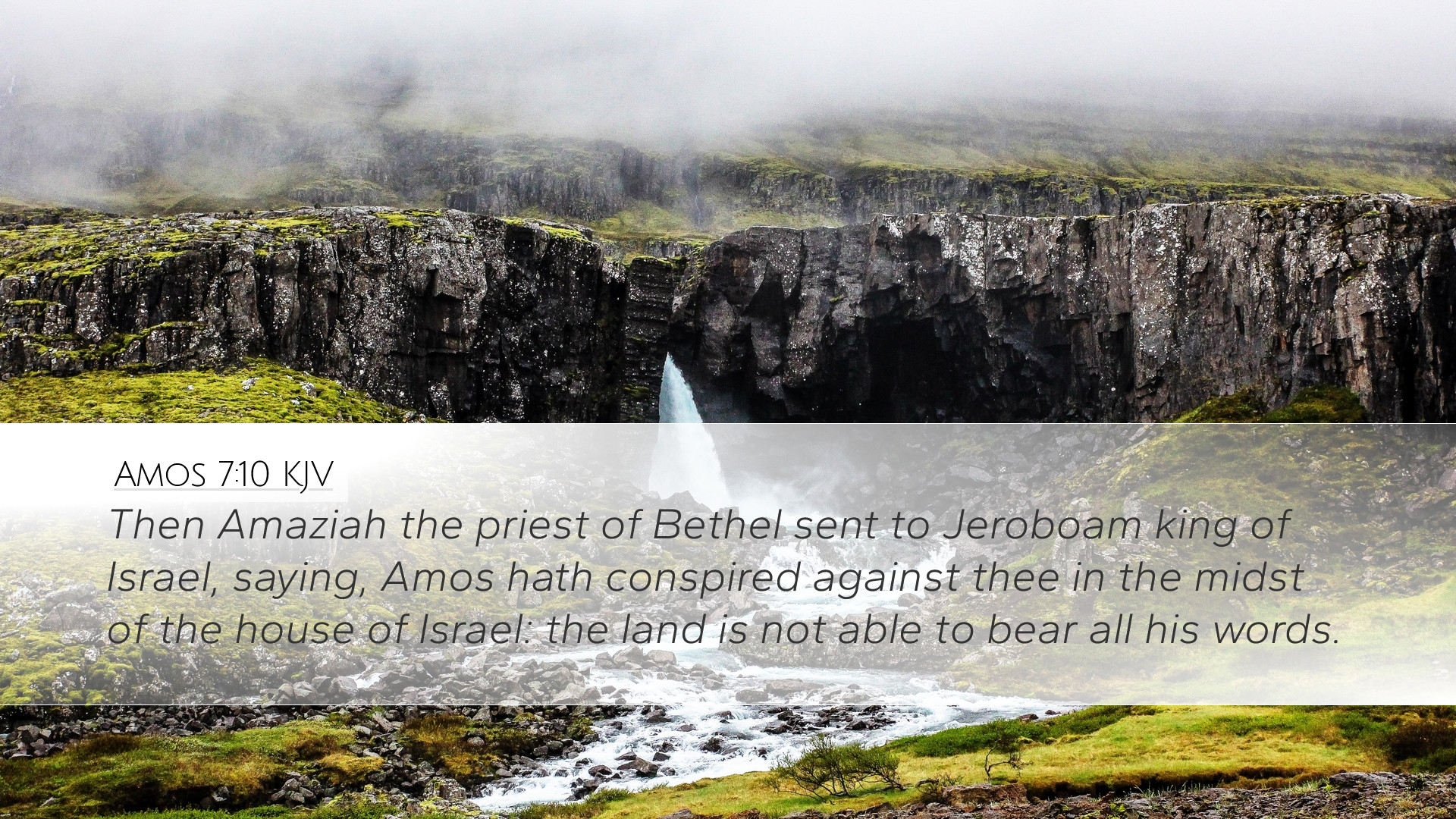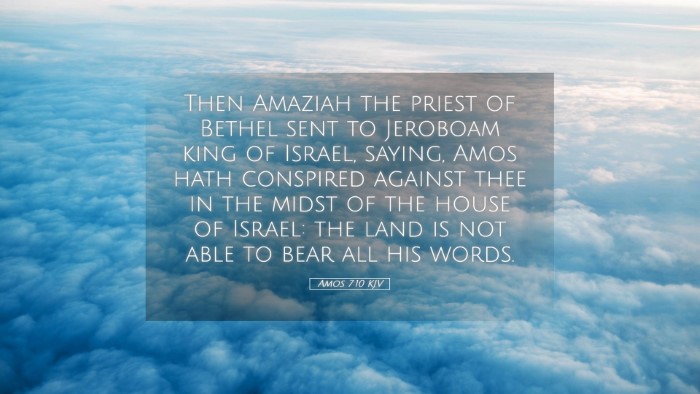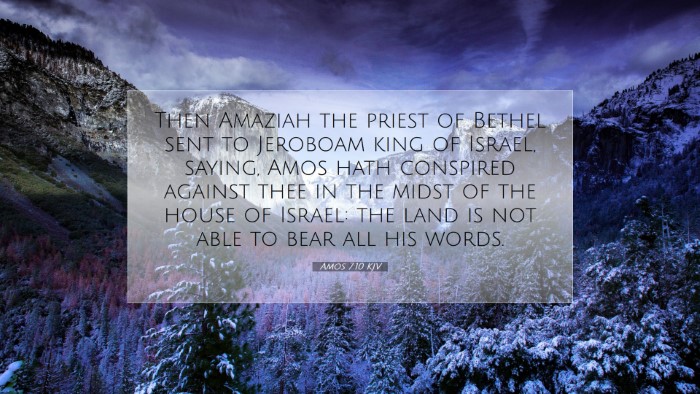Old Testament
Genesis Exodus Leviticus Numbers Deuteronomy Joshua Judges Ruth 1 Samuel 2 Samuel 1 Kings 2 Kings 1 Chronicles 2 Chronicles Ezra Nehemiah Esther Job Psalms Proverbs Ecclesiastes Song of Solomon Isaiah Jeremiah Lamentations Ezekiel Daniel Hosea Joel Amos Obadiah Jonah Micah Nahum Habakkuk Zephaniah Haggai Zechariah MalachiAmos 7:10
Amos 7:10 KJV
Then Amaziah the priest of Bethel sent to Jeroboam king of Israel, saying, Amos hath conspired against thee in the midst of the house of Israel: the land is not able to bear all his words.
Amos 7:10 Bible Commentary
Amos 7:10 Commentary
Verse: "Then Amaziah the priest of Bethel sent to Jeroboam king of Israel, saying, Amos hath conspired against thee in the midst of the house of Israel: the land is not able to bear all his words."
Contextual Overview
The Book of Amos is a profound work within the Minor Prophets, focusing on judgment and social justice. Written during a time of prosperity in Israel, Amos calls out the injustices and idolatry prevailing among the people. This particular verse serves as a turning point in the narrative, marking a clash between prophetic truth and institutional power.
Commentary Insights
Amaziah's Role
Matthew Henry reflects on Amaziah as a corrupt priest who represents the establishment's opposition to prophetic voices. He notes that Amaziah's report to king Jeroboam is not rooted in truth but rather an attempt to protect his position and suppress God's message. This draws attention to the tension between true worship and institutional religion.
The Accusation Against Amos
Albert Barnes elaborates on the significance of the term "conspired." The implication here is that Amos's message is seen as a political threat, especially as he prophesies against the king and the socioeconomic injustices of Israel. This political dimension underlines the danger of prophetic ministry in the face of corrupt leadership, reminding us of the challenge faced by those who speak truth to power.
The Weight of Prophetic Words
Adam Clarke emphasizes the phrase "the land is not able to bear all his words." This reveals the idea that the truth of God's judgment is heavy and burdensome for a people entrenched in sin. Clarke states that prophetic messages often confront the status quo, breaking through complacency and forcing a reckoning with sin, thus becoming intolerable for those who prefer comfort over confrontation.
Theological Implications
The opposition against Amos highlights a recurring theme in biblical narratives: the resistance faced by those who stand for truth. This confrontation teaches valuable lessons:
- The Cost of Prophecy: True prophetic voices often face hostility and misunderstanding, especially when their messages challenge the power structure.
- Institutional Resistance: The church and religious institutions must be cautious of becoming complacent and resistant to God's true voice.
- The Nature of Spiritual Warfare: Amos's experience illustrates that the struggle for faithfulness is often fought in the realm of ideas and public truth.
Lessons for Today
For contemporary pastors and theological scholars, this passage serves as a reminder of the importance of remaining faithful to the truth of God's Word, even in the face of opposition or hostility. The case of Amos prompts a self-examination of our own ministries and the societal structures we operate within:
- Embrace the Prophetic Call: Are we listening to God’s voice, especially in challenging issues? What is God asking us to confront in our contexts?
- Stand Against Corruption: How do we respond when our convictions clash with institutional practices? Faithfulness may require difficult choices.
- Promote Justice and Righteousness: Are we advocating for the marginalized as Amos did? This emphasizes the role of the church in societal reform.
Historical Background
Understanding the historical context of this confrontation sheds light on its significance. Amos was a shepherd and a fig farmer from Tekoa, a village in Judah, yet he was called to prophesy in the northern kingdom of Israel. This background enhances the gravity of his message as an outsider speaking against the injustices and moral decay of a nation.
The Denunciation of Idolatry
The prophetic confrontation includes denouncing idolatrous practices present in Bethel, particularly the worship of golden calves. Matthew Henry notes that this imagery represents the persistent human tendency to idolize power and wealth over divine authority. The focus here is on the need for repentance and a return to true worship.
Conclusion
Amos 7:10 serves as a powerful reminder of the role of the prophet in society and the tensions that arise from speaking truth in a world that often prefers silence. As we reflect on this passage, let us be encouraged to uphold the truths of Scripture with courage and grace, speaking out against oppression and idolatry while remaining faithful to God's call. It challenges each of us to reflect on how we can be instruments of change, echoing the prophetic call amidst our cultural landscape.


